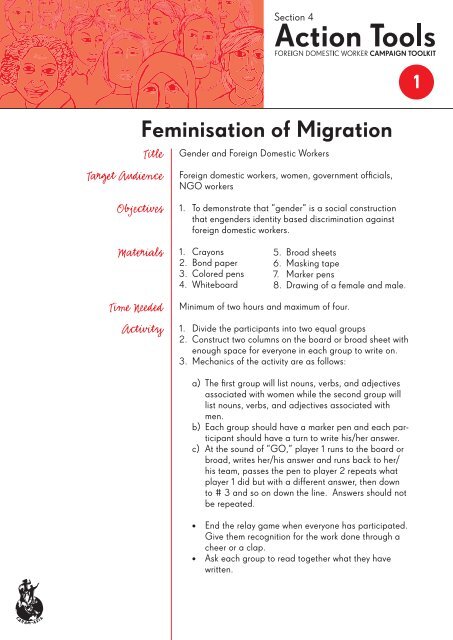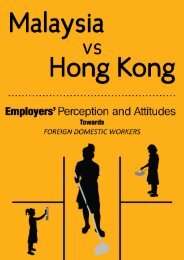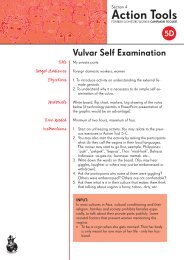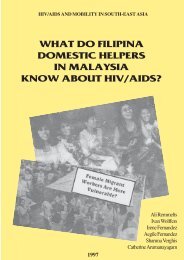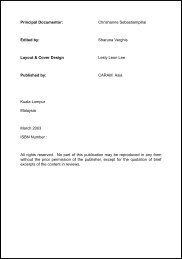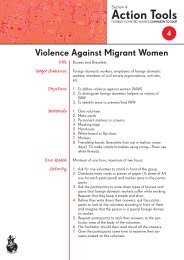01 – Feminisation of Migration - CARAM Asia
01 – Feminisation of Migration - CARAM Asia
01 – Feminisation of Migration - CARAM Asia
Create successful ePaper yourself
Turn your PDF publications into a flip-book with our unique Google optimized e-Paper software.
1<br />
<strong>Feminisation</strong> <strong>of</strong> <strong>Migration</strong><br />
Gender and Foreign Domestic Workers<br />
Foreign domestic workers, women, government <strong>of</strong>fi cials,<br />
NGO workers<br />
1. To demonstrate that “gender” is a social construction<br />
that engenders identity based discrimination against<br />
foreign domestic workers.<br />
1. Crayons<br />
2. Bond paper<br />
3. Colored pens<br />
4. Whiteboard<br />
5. Broad sheets<br />
6. Masking tape<br />
7. Marker pens<br />
8. Drawing <strong>of</strong> a female and male.<br />
Minimum <strong>of</strong> two hours and maximum <strong>of</strong> four.<br />
1. Divide the participants into two equal groups<br />
2. Construct two columns on the board or broad sheet with<br />
enough space for everyone in each group to write on.<br />
3. Mechanics <strong>of</strong> the activity are as follows:<br />
a) The fi rst group will list nouns, verbs, and adjectives<br />
associated with women while the second group will<br />
list nouns, verbs, and adjectives associated with<br />
men.<br />
b) Each group should have a marker pen and each participant<br />
should have a turn to write his/her answer.<br />
c) At the sound <strong>of</strong> “GO,” player 1 runs to the board or<br />
broad, writes her/his answer and runs back to her/<br />
his team, passes the pen to player 2 repeats what<br />
player 1 did but with a different answer, then down<br />
to # 3 and so on down the line. Answers should not<br />
be repeated.<br />
• End the relay game when everyone has participated.<br />
Give them recognition for the work done through a<br />
cheer or a clap.<br />
• Ask each group to read together what they have<br />
written.
4. Ask the participants the following questions:<br />
• What do you notice about the words associated with<br />
Women Men What are the similarities and differences<br />
• Are these positive or negative words Explain your<br />
answer.<br />
• Suppose we changed the MEN/WOMEN heading<br />
on the two columns into WOMEN/MEN. Are there<br />
words that do not fi t in Explain your answer.<br />
• Which words apply to both men and women<br />
• Which words apply only to men Women What<br />
does this signify<br />
What is sex and gender<br />
SEX Biologically determined; it is something fi xed<br />
male & female<br />
GENDER Socially determined; it is a variable concept,<br />
meaning its construction varies over time and<br />
across cultures; since it is a social construct, it<br />
can be changed.<br />
Male <strong>–</strong> Masculine<br />
Female <strong>–</strong> Feminine<br />
Where does gender come from<br />
• Gender roles assigned to men and women have been<br />
dictated by society, hence, gender stereotyping.<br />
• This gender stereotyping is acquired through the socialisation/gendering<br />
process.<br />
What are gender stereotypes Gender stereotyping<br />
GENDER The ascribed traits characteristics, attributes<br />
and roles relegated to men and to<br />
STEREOTYPES<br />
women. The assumption behind stereotypes<br />
is that these ascribed attributes <strong>of</strong><br />
men apply to all men and those to women<br />
apply to all women in a given society.<br />
GENDER<br />
STEREOTYPING<br />
The tendency <strong>of</strong> a given culture to ascribe<br />
particular traits, characteristics and<br />
roles distinctly to a man and/or woman.<br />
Individuals are then judged according to<br />
their group’s identity.
• Men and women are conditioned to act out roles in their<br />
behaviour and thinking which are determined by society<br />
as appropriate for feminine and masculine roles and<br />
characteristics. From their childhood to their adult years<br />
women are taught how to be feminine and men, how<br />
to be masculine. This is called the SOCIALISATION<br />
process.<br />
• The socialisation <strong>of</strong> men and women is strongly infl u-<br />
enced by cultural institutions such as family, education,<br />
religion, and the media.<br />
• It is important that women and men realise that their<br />
stereotyped roles/characteristics and/or the fi ctitious<br />
idea <strong>of</strong> femininity and masculinity are assigned by society<br />
and therefore it can be challenged and “undone”.<br />
• Implications <strong>of</strong> such stereotypes to foreign domestic<br />
workers:<br />
i. Led to the sexual/gender division <strong>of</strong> labour (production-reproduction<br />
divide)<br />
ii. Double burden <strong>of</strong> women <strong>–</strong> division <strong>of</strong> production-reproduction<br />
sphere has doubled the burden <strong>of</strong> women<br />
participating in productive activities. Aside from<br />
engaging in full time productive work (as in the case<br />
<strong>of</strong> foreign domestic workers), housework and child<br />
care remain their responsibility.<br />
iii. Women lose their identity and capacity for full human<br />
development <strong>–</strong> stereotyped roles discriminate<br />
women from equal participation in the productive<br />
spheres.<br />
iv. Women as well as men are victims <strong>of</strong> such stereotypes<br />
<strong>–</strong> men who want or are engaged in traditionally<br />
female roles are negatively deemed “henpecked”,<br />
“effeminate”, “wimp”, “mama’s boy” and while on<br />
the positive side they are considered “extraordinary,”<br />
“the ideal & perfect husband,” “a saint,” and “a<br />
good catch.” Women who are engaged in traditionally<br />
male roles are looked upon on the negative side<br />
as “boyish,” “lesbians,” “exceptions to the rule,”<br />
“bitches,” “women with strong personalities (as if it’s<br />
not right for women to have strong personalities),”<br />
“stiff”, “not a good mom/wife (if they are working<br />
mothers and something bad happens to the family)”,<br />
“supermom” or “superwoman” (but with a double<br />
edged meaning).
Foreign domestic workers should free themselves from such<br />
stereotyped roles/characteristics <strong>–</strong> since this stereotyping<br />
has created injustice against women. It is only by freeing<br />
themselves from such stereotyped roles and introducing<br />
changes that women can enjoy their right to full human<br />
development. Women have common experiences in role stereotyping<br />
in varying levels and forms: vis-à-vis men, women<br />
are in an inferior situation and subordinate position. Therefore,<br />
to correct this inequality between men and women<br />
in most societies, there is a need to visualise change and<br />
organise women towards realising this vision <strong>of</strong> change.


